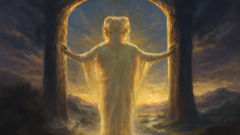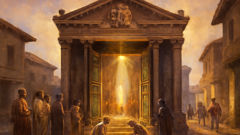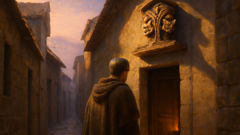Introduction
In the golden haze of dawn, when Rome’s seven hills stretched their long shadows across dew-laced stones, the city lived in a perpetual dance with beginnings and endings. It was an era where gods wandered the marble streets, and each household doorway was believed to hold the breath of a divine watcher. No god was so entwined with the pulse of daily life as Janus, the ancient guardian of gates, thresholds, and time’s ever-turning wheel. With two faces, one gazing toward the vanished past and the other toward the veiled future, Janus embodied all transitions—the opening of a new year, the crossing from one world to the next, the silent moment between the rise and fall of a breath. His presence could be felt in the clatter of a latch, the creak of a city gate at dawn, and the soft hush that lingered before every journey or decision. To Romans, Janus was both a comfort and a warning: his dual gaze meant nothing escaped his sight, not the regrets of yesterday nor the trembling hope of tomorrow. His temples had no roofs, open to the sky, to let prayers rise directly to the heavens, for Janus needed no walls to separate one world from the next. And as the city flourished—its market stalls bursting with figs and olives, its forums echoing with oratory—Janus remained, silent but watchful, his story woven into every beginning and ending Rome would ever know.
The Birth of Janus and the Dawn of Time
Before the Tiber flowed blue and proud through Rome, before even Saturn’s seed had sprouted civilization in Latium, there was only chaos and the trembling hush before existence. From that silence, Janus was born—not from mother or father, but from the need for a beginning, a first opening. He emerged at the threshold of creation itself, forged from possibility and the space between past and future. His first vision was the dividing line between night and day: the moment where darkness surrendered to light, where what had been ended and what could be was just beginning.

Janus’s earliest days were spent alone, watching the world unfold with his twin faces. He saw what had just come to pass and what would soon be. Each step he took left a doorway in his wake—a crack in the air where one era could pass into another. When Saturn, the god of sowing and time, arrived in Italy seeking refuge from the relentless pursuit of his own son Jupiter, it was Janus who greeted him. With wisdom beyond reckoning, Janus welcomed Saturn and split his own dominion in two: he would rule the beginnings and endings of places, while Saturn would shepherd the seasons.
Together, they ushered in a golden age. Under Janus’s gaze, people learned to build doorways, not only to keep out the cold but to mark the sacred act of entering and leaving. He taught them that every passage was holy, every decision a crossing between worlds. Janus blessed rivers, bridges, gates, and city thresholds. His temples were the first to be built with open roofs, for transitions cannot be contained. When the time came for Saturn to depart, Janus remained, taking up his vigil at every border Rome would ever know.
The Romans grew to revere him. Every new venture—be it the first stone of a house, the first step of a journey, or the opening of a new year—was begun with prayers to Janus. His wisdom became their guide, a silent promise that every beginning carried echoes of the past and every ending shaped what was to come. And so, Janus stood eternal, the silent architect of time’s endless passage.
The Keeper of Gates: Janus’s Gift to Rome
As Rome grew from humble huts along the Palatine Hill to a bustling city resounding with the noise of traders and poets, Janus’s presence became woven into every stone and street. Every gate, from the grand arches that welcomed returning armies to the low doorways of poor homes, bore his likeness. Carved from marble or painted in ochre, his two faces appeared wherever decisions loomed—at crossroads, on bridges, and above the city’s most secret thresholds.

It was said that Janus could see the hidden paths in all things. One face forever peered into what had been: he saw the mistakes and triumphs, the love and loss, embedded in every step. The other watched what might come, weighing possibilities like coins in a careful hand. Because of this, Romans turned to him in times of uncertainty. They whispered his name before marriages and departures, before the birth of a child or the first plough of spring. The city’s greatest generals would not lift a sword without first seeking Janus’s blessing, for every war was a gate—once crossed, there was no return to innocence.
Janus’s temple became the city’s heartbeat. Its doors stood open in times of war and closed in peace, a symbol so potent that the fate of Rome itself seemed tied to those bronze portals. When the city was safe, the doors were shut, and the people rejoiced; when danger threatened, they swung wide, inviting Janus to watch over Rome’s uncertain steps. Within the temple’s shadow, mortals gathered to ask for guidance. Some left offerings of honey cakes or oil, hoping to sweeten their future or illuminate a path out of sorrow. Others simply touched the cold marble, trusting that Janus saw both their burdens and their dreams.
Through centuries of triumph and calamity—the fires that swept through crowded alleys, the invasions that thundered at the walls—Janus endured. His wisdom was patient, his gaze unwavering. It was said that even the other gods respected his counsel, for Janus alone remembered the whole of time, unbroken by pride or passion. For Romans, his presence was a quiet reassurance: every ending led to a beginning, and in every threshold lay the chance to choose anew.
The Faces of Janus: A Tale of Regret and Hope
Among Rome’s crowded alleys lived a craftsman named Lucius, renowned for his skill with wood and his troubled heart. Lucius bore the weight of a past mistake—a promise broken in his youth that had driven away his beloved Livia, leaving him haunted by regret. Every day, he passed beneath a small shrine to Janus set above his workshop door, carved by his own hands. The god’s twin faces seemed to watch him, one stern and ancient, the other gentle and new. Though Lucius tried to focus on his work, the shadow of his past clung to him like ivy.

One winter morning, as frost glazed the rooftops and Rome stirred beneath a pale sky, Lucius found himself at a crossroads—both literal and within his soul. He had received word that Livia was returning to Rome after many years, seeking her childhood home. Fear tangled with hope in his chest. Should he seek forgiveness? Would she remember him with kindness or pain?
That night, Lucius dreamed of Janus. The god appeared beside a grand archway bathed in starlight, his two faces ageless and knowing. "You stand at a threshold, Lucius," Janus intoned. "One face gazes at your regret, the other at your hope. Only you may choose which you follow."
Awakening before dawn, Lucius wrapped himself in his old cloak and set out through silent streets toward Livia’s home. Each step felt like crossing a gate he’d built for himself long ago. At her door, his hand trembled. But as he hesitated, he recalled Janus’s words—and for the first time in years, he let hope guide him.
Livia answered, older and wiser but still kind. Their conversation was awkward, halting at first, as memories flooded between them. Yet with each word, Lucius felt the weight of the past shift. He apologized for his failings, speaking honestly about his regret. Livia listened, then smiled softly. "We all live with two faces," she said. "But perhaps it is time we look forward."
That day, Lucius understood Janus’s greatest lesson: every ending is the root of a beginning. He and Livia began to rebuild their friendship, and Lucius’s heart grew lighter with each new day. He carved a new figure of Janus for his doorway—this time with both faces smiling—reminding himself that wisdom lies not in dwelling on regret or hope alone, but in standing bravely at the threshold between them.
Conclusion
Janus’s myth endures not only in marble statues or ancient texts, but in every moment where life turns from what was to what could be. His two faces—one wise with memory, one bright with anticipation—remind us that all beginnings are born from endings, and every choice is a gate between worlds. The Romans may be long gone, their city changed by centuries, but the spirit of Janus lingers wherever decisions are made and thresholds are crossed. In the hush before a journey, in the silence after farewells, and in the hopeful breath before a new year’s first dawn, his watchful gaze offers both caution and courage. To honor Janus is to accept the fullness of life: to remember, to hope, and to step forward with wisdom. His legacy is not simply about gods and temples—it lives in all who dare to begin again.













